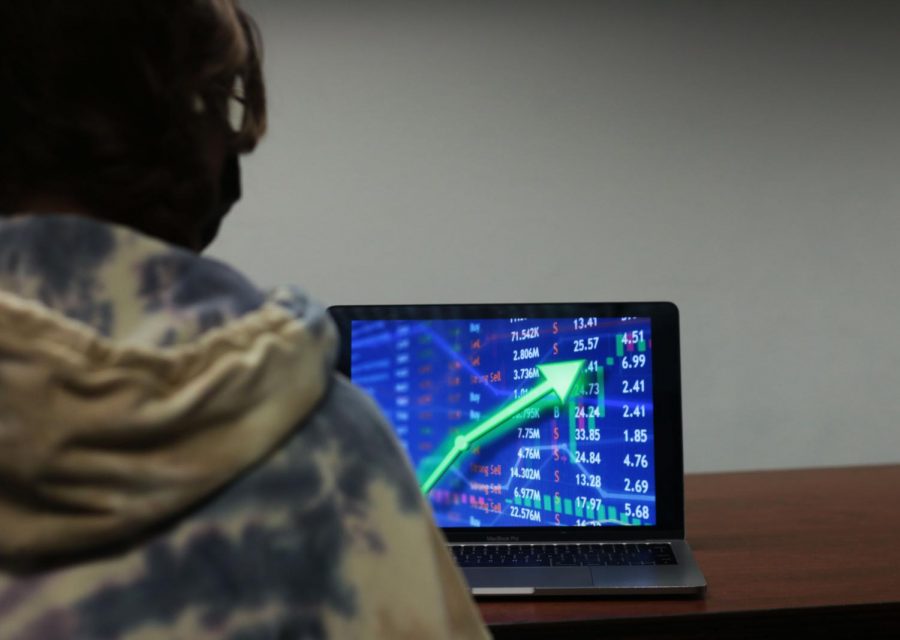Everything you need to know about GameStop, Reddit and Wall Street
A retail trader is someone who trades their own money, but not for a living. Most retail traders use commission-free brokers like Robinhood which were made for the average trader to use.
Over the past few weeks, the news has been filled with confusing stories about GameStop, Reddit and Wall Street. Here’s what actually happened with the big players involved and how this could affect young investors.
What actually happened and the big players involved:
There are five main players involved in what happened in the stock market: GameStop, Redditors, hedge funds, Robinhood and dark pools.
GameStop’s stock has been on the rise since August when Ryan Cohen petitioned GameStop to turn the company into an e-commerce retailer for gaming products and was granted a seat on the board of directors.
This business move put GameStop on the radar for new investments because of Cohen’s success with Chewy, Inc., the e-commerce pet product company he founded and sold. On Oct. 8, Microsoft announced a partnership with GameStop, a deal that alerted many traders that GameStop should be taken seriously since it now had two very large backers.
This is when many traders saw dark pools, which are private exchanges for wealthy investors to trade without affecting the market, began to start buying GameStop. GameStop’s stock stayed steady around $12 with a few noticeable shifts until Dec. 21 when Cohen upped his share of GameStop to 12.9%, which signaled many traders to pay attention to GameStop, if they hadn’t already, and raised GameStop’s stock from $15 to $20. The stock continued to gradually rise until Jan. 13, when it jumped from $20 to $30 with no major news or reason as to why.
Despite GameStop’s stock rising, the hedge fund Melvin Capital, among others, decided to continue shorting GameStop. Shorting is where someone borrows shares from someone else, typically a broker, and then waits for the stock price to fall more to buy it back at a lower price, returning the shares to the broker and pocketing the difference.
When done correctly, a short can have a significant payoff, but when it goes wrong, it can be devastating. GameStop has historically been a favorite to short as the company is not run very well, but it’s a particular favorite of Melvin Capital’s founder Gabe Plotkin, who staked his reputation on his belief that GameStop would fail.
Plotkin continued to increase his shorts as hedge funds bought GameStop in dark pools, leading Plotkin to an inevitable dead end. The WallStreetBets subreddit, which was started in 2012 and became a central hub for the “meme economy,” began to write about retail stocks that were being shorted, ie. GameStop.
For months, Redditors have been attempting to target the GameStop stock and drive up the price, which would create a “short squeeze.” A short squeeze happens when a stock price rises so high that the short sellers have to buy back the stock, ultimately costing the short sellers an immense amount of money. With GameStop’s stock rising as it had been, many traders had predicted a short squeeze would occur: it was just a matter of when.
Everything exploded on Jan. 25 when the stock began to climb drastically and eventually closed at $364.15 on Jan. 27. Although the narrative that has been published is that the Redditors were the sole perpetrators in this frenzy, no one knows why the stock changed so drastically on that day. The Redditors had been trying to do that for months with no success, which is documented throughout the subreddit, so it was likely a combination of the Redditors, hedge funds and Wall Street piggybacking off of each other after the initial trigger that made the stock explode.
Melvin Capital was bailed out and saved from collapse by hedge funds Citadel and Point72 with a whopping $2.75 billion on Jan. 26. The CEO of Point 72, Steve Cohen, trained Plotkin as his protegee at SAC Capital and had a personal reason to bail him out, but Citadel has no known motive to have bailed Plotkin. It is also worth noting that both Plotkin and Cohen were at SAC Capital when four of their businesses pled guilty to insider trading, in which Cohen was suspected of buying his way out of a sentence.
Citadel LLC, founded by Ken Griffin, is split into Citadel, a multinational hedge fund, and Citadel Securities, a dominant market marker. Citadel Securities pays Robinhood, a free broker for everyday traders, a fee for every trade carried out, which is known as a “payment for order flow.” This means that Citadel has access to every single trade made through Robinhood, which is the broker of choice for many average traders. Citadel LLC’s most recent quarterly report showed that it had 2.5 million puts, which are bets that GameStop’s stock would fall, and two million calls, which are bets that GameStop’s stock would rise, and owned 111,805 shares of GameStop.
Overall, Citadel was in a very good position to make money if GameStop’s stock was turbulent. Citadel also filed on Jan. 15 that it manages close to $230 billion for its 19 clients, while Citadel Securities pays for Robinhood’s data that tells them what to trade against. The upper hand that Citadel has had throughout this frenzy was nearly impossible to compete against, and many finance analysts suspect they may have played a much larger role than we currently know.
Another player that many suspect had more happening behind the scenes was Robinhood. On Jan. 28, Robinhood began restricting transactions for stocks being targeted, namely GameStop, and only allowed users to close their positions, prompting immediate fury across social media and incited many class action lawsuits. Robinhood CEO Vlad Tenez is expected to testify on Feb. 18 before the House Financial Services Committee panel about Robinhood’s possible collusion with institutional investors like Citadel and their actions in restricting transactions for retail traders.
As new reports are coming in, it is clear the narrative of David vs. Goliath being pushed doesn’t fit what happened. The Redditors banded together to target GameStop, and had been for months, but their actions were perpetuated and amplified by big players in Wall Street through dark pools and hedge funds who caught on to GameStop’s rising stock in the months prior — the culmination resulted in GameStop’s stock skyrocketing. The big idea of what happened is that no one knows exactly what happened. What we do know is that things will be changing in the market, particularly with young investors.
Advice for Young Investors
Many might be questioning why you should care about this GameStop fiasco. The main reason is that the current narrative of Reddit vs. Wall Street that is being reported will drastically harm young investors, particularly students just entering the stock market, who think that they can manipulate the market exclusively with memes.
This narrative was pushed for a reason: it provides an easy cover for hedge funds to make money off young investors who do not know any better. Social media gives retail traders a place to communicate immediately and will ultimately impact how the market functions, but institutional traders have access to all online communication as well as the actual trades being done through the payment for order flow transactions mentioned earlier.
“News travels faster now, and one person can have an audience of millions,” Economics teacher Douglas Hutchison said. “We’ve had instances in the past like this — such as Jay Z using his massive number of Twitter followers to ‘pump and dump’ a penny stock he had purchased — but not of this magnitude.”
If you plan to invest or use commission-free brokers like Robinhood, you need to be careful and make trades based on data and research. Anyone is well within their rights to base their decisions off of Reddit as it is a free market, and that option should not be restricted, but young investors in particular need to be careful with the sources they use to make their trading decisions.
“If you do not have good information, you will not make good decisions,” Economics teacher Caroline Parrish said. “Think back to the Great Depression and people buying stock on margin. They did not have the knowledge to understand the risks associated with the strategy, and they lost big.”
For the average student trying to navigate the stock market, making trade decisions using the infamous Reddit “you only live once” method and the meme economy is a dangerous and risky method to trade with. Students need to understand what happened with GameStop was not an act committed solely by the Redditors on a whim, but was a very rare culmination of events over the past few months by traders, Reddit and Wall Street alike, that had been waiting for GameStop’s stock to inevitably explode.
“Large investors are investing the money of others; redditors are using crowdsourcing instead,” Hutchison said. “I think they both had an equal role [in the short squeeze] and both can use their power to leverage the market [in the future]. Students just need to be careful to manage the risks versus rewards. When investing in a stock, [they] must understand [they] could lose money and be financially [responsible for those losses].”
Young investors are being manipulated into thinking that they can base their decisions solely off of memes and social media trends. GameStop’s short squeeze was months in the making, but many investors will never know the truth and think that they can manipulate the market with a single TikTok, leading many to make bad decisions that hedge funds can profit off of.
For the students who vaguely heard about what happened with GameStop and wanted to get in on the action, you need to look at what is truly happening before you start to invest. Although many Redditors and young investors did profit off GameStop, young investors are the most vulnerable going forward. What happened with GameStop cannot be easily replicated, despite how it’s being portrayed in the news. Young investors need to understand that what happened was not David versus Goliath, but rather Goliath versus Goliath.

Senior Jacquelyn Burrer is a reporter and this is her first year on staff. She loves drinking coffee, playing the flute, studying history and reading books.

Senior Arisha Hirji is the web editor and this is her third year on staff. She enjoys painting in her free time, hanging out with friends and listening...













